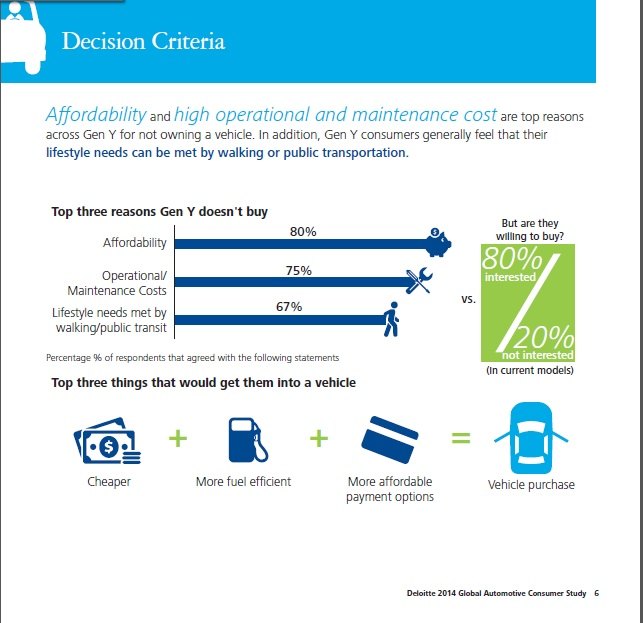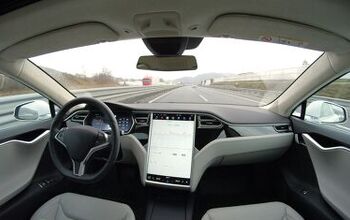Generation Why: Deloitte Study Shows That Money, Not Ideology Is The Biggest Obstacle To Car Ownership
One of the main criticisms of Generation Why is the lack of hard data to support this column’s ongoing thesis: that the lack of interest in car ownership among millenials is related to economics, rather than any sort of anti-car/pro-environment/pro-urban ideological shift among young people. Now, a key study from Deloitte confirms our initial hunch: young people want cars, but cannot afford them, and the notion of a car-free future, with walking, cycling and transit replacing the automobile (whether privately owned or shared via a service like Zipcar) is an unrealistic fantasy that somehow continues to have currency.
Deloitte’s annual Global Automotive Consumer Study surveyed 23,000 people across the globe, representing 19 different countries. The copy provided to TTAC focuses on the 2,000 Americans surveyed by Deloitte, with a subset of those (roughly 700) taken from “Generation Y”, born between 1977 and 1994.
The study’s findings largely confirm what Generation Why has maintained all along. According to the study, 80 percent of millennial surveyed say that affordability is the key factor keeping them out of a new vehicle, with maintenance costs coming in second place at 70 percent. On the other hand, 67 percent said that walking and other forms of transit were sufficient to meet their current lifestyle needs.
The current meme of new cars being homogenous, devoid of character and unappealing to younger buyers is at odds with Deloitte’s finding that 80 percent of consumers are interested in new models available on the market place. The study doesn’t say which models: many of us would love an Audi S4 or a Mustang 5.0, and find something like a Chevrolet Spark unappealing. Considering that Deloitte suggests cheaper, more fuel-efficient vehicles with more affordable payment options as a way of enticing younger buyers, it would appear that expectations may need to be tempered on the part of Gen Y buyers when looking for an affordable new car. The sense of wanting it all without having to pay for it is further reflected later in the study, with millennial buyers expressing a strong interest in advanced safety, infotainment and in-car connectivity features, but with only 27 percent willing to pay more than $2,500 for these features, while 21 percent are unwilling to pay anything extra to get them.
The cost of driving is a pervasive theme throughout. Gen Y drivers are three times as likely to give up their car if the cost of driving becomes too high, and would be willing to give it up if it conflicted with their lifestyle choice (like living in a walkable neighborhood where a car is a hassle or unnecessary). Even the desire for a hybrid powertrain (strong among Gen Y buyers) is motivated by cost savings rather than any sort of environmental consciousness, with 53 percent of young consumers telling Deloitte that saving money on fuel is their primary motivation for opting for alternative powertrains.
Even with affordability emerging as the key factor in getting younger buyers to purchase new cars, 92 percent of the those surveyed plan to buy a new car at some point, with 75 percent planning on purchasing one within 5 years. Based on Deloitte’s findings, it looks as if the mass abandonment of the automobile will continue to be a pipe dream for only the most radical anti-car types, but don’t look for it to disappear from public discourse any time soon.
More by Derek Kreindler
Latest Car Reviews
Read moreLatest Product Reviews
Read moreRecent Comments
- Fed65767768 Nice find. Had one in the early-80s; loved it but rust got to it big time.Still can't wrap my head around $22.5K for this with 106,000 km and sundry issues.Reluctant (but easy) CP.
- El scotto err not be an EV but to own an EV; too much training this week along the likes of what kind of tree would be if you were a tree? Sorry. Bring back the edit function.
- The Oracle Geesh, Stellantis can’t even perform the upkeep on that relic of a plant. Sad.
- The Oracle I see Tesla introducing disruptive charging technology within 3 years.
- The Oracle I can see into the future and I see fisticuffs and profanity-laced tirades coming to charging locations near ya’ll.


































Comments
Join the conversation
It's interesting how they claim we want all these silly features. I'm 21 and drive a '97 Sentra, a gift from my grandma, and due to a combination of finances and it being an otherwise pleasant car, I have no plans to get rid of it after now-5 years of driving. Sell me a stripper car that doesn't look angry and has decent visibility, and let ME choose the options. I'd take crank windows and seat warmers. I wouldn't want to buy a car that costs a ton of money and has features I didn't want in the first place.
The ideology take is interesting. I think we have a similar thing here in Australia, where there has been a marked shift to smaller cars. Of course this has been very detrimental to Holden who used to make Australia's best selling car in the Commodore. Now it barely makes top 5. Of course everyone criticized Holden for now making a car no one wants because current thinking is everyone WANTS a smaller car. But like here, the truth is I do not think everyone wants a smaller car at all. It is just all most can afford right now ....